If Christopher Luxon can’t learn to set the agenda, the opposition will keep writing the script and it won’t have a happy ending.
The biggest obstacle to National winning a second term isn’t Chris Hipkins. It isn’t the Greens, Te Pāti Māori, nor any kind of breakdown in relationship with its coalition partners. It’s National itself, specifically, its inability to communicate with New Zealanders in a way that fosters trust, engenders hope, and builds confidence.
Good governance matters. Competent ministers, sound policy, and stable leadership are the foundations of any successful government. But in politics, you can do all the right things and still lose if you don’t tell your story…and tell it better than your opponents tell theirs.
Right now, National is letting others tell the story of this government, and when you leave a vacuum, the void will always be filled.
Right now, National is letting others tell the story of this government, and when you leave a vacuum, the void will always be filled.
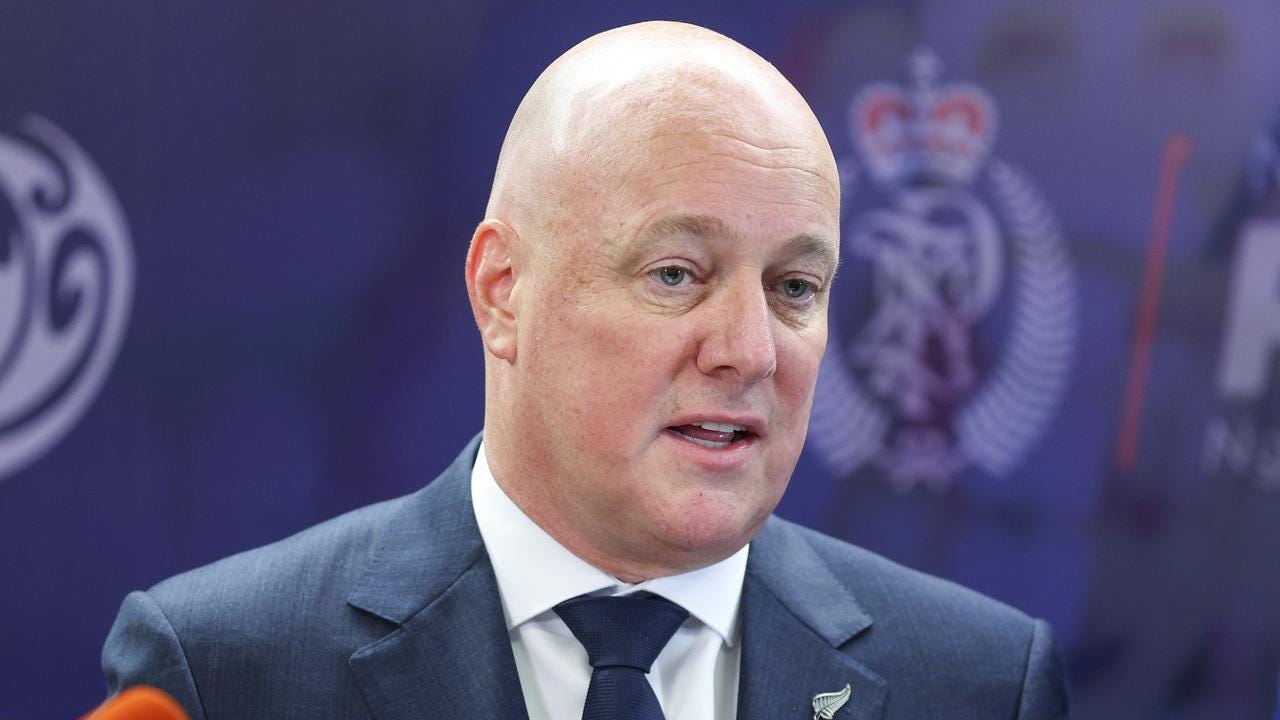
The agenda belongs to those who seize it.
Winston Peters understands this truth instinctively. He knows how to wake up in the morning, decide what the news cycle will be, and make it happen. He doesn’t just respond to events (though he is skilled at that too) he creates them.
Peters, with his decades in the game, is a master of timing. He knows that a well-placed soundbite at 10am can dominate talkback (and socials) by lunchtime and lead the 6pm news. He is a natural at identifying what Kiwis will respond to emotionally and framing complex issues in a way that feels urgent and human.
National, by contrast, often seems to wait for the agenda to be set by others and then they react to it. It’s like running from fire to fire with a bucket of water while your opponent is out front deciding where the next blaze will be lit. You can scramble all you like, but you’re not dictating the game.
It’s worth distinguishing between propaganda and good political storytelling.
Propaganda bends or ignores the truth to serve a pre-determined outcome. Storytelling, in politics, is about explaining truth in a way that resonates; putting policy into human terms and linking it to values voters already hold.
Jacinda Ardern’s communications team (like her politics or not) understood this better than anyone in recent New Zealand history. Every press conference had structure. There was always a beginning, middle, and end. A relatable hook, a clear narrative, and a headline-worthy takeaway. Even when the news was bad, she owned the framing. She played the lead role in the movie of her own government and the opposition were often stuck as background extras.
Her communications strategy wasn’t complicated, but it was ruthlessly effective. Every message was framed around emotion, empathy, and a clear moral position. Her team understood that most people don’t remember policy detail, but they do remember how you made them feel. So they turned every government action, even the mundane ones, into part of a bigger story about kindness, unity, and “being on the right side of history.” The result was that Ardern often looked like she was leading the conversation even when she was simply front-running public sentiment.
Jacinda Ardern’s communications team (like her politics or not) understood this better than anyone in recent New Zealand history. Every press conference had structure. There was always a beginning, middle, and end. A relatable hook, a clear narrative, and a headline-worthy takeaway. Even when the news was bad, she owned the framing. She played the lead role in the movie of her own government and the opposition were often stuck as background extras.
Her communications strategy wasn’t complicated, but it was ruthlessly effective. Every message was framed around emotion, empathy, and a clear moral position. Her team understood that most people don’t remember policy detail, but they do remember how you made them feel. So they turned every government action, even the mundane ones, into part of a bigger story about kindness, unity, and “being on the right side of history.” The result was that Ardern often looked like she was leading the conversation even when she was simply front-running public sentiment.
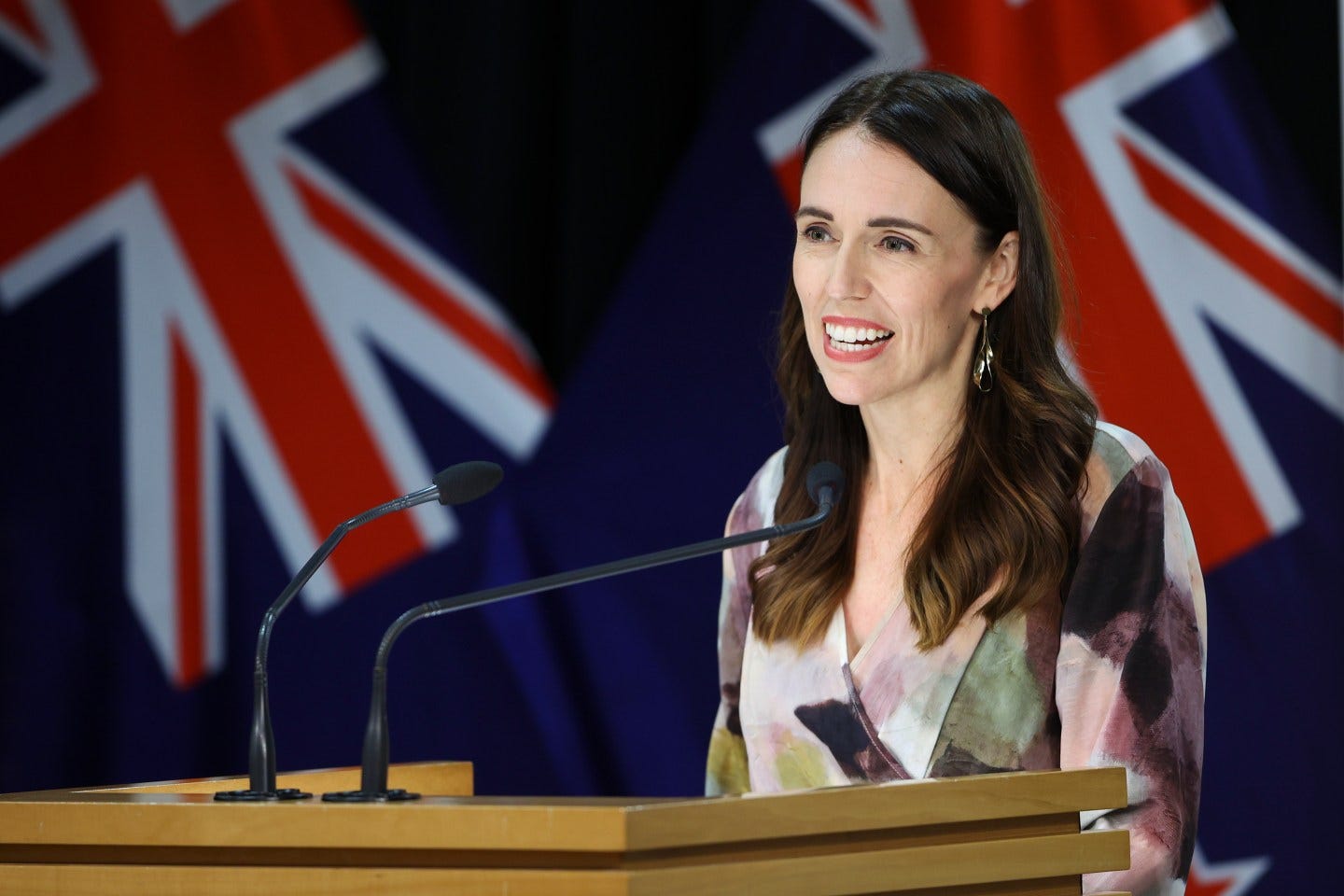
She was backed by an experienced, disciplined, and media-savvy team including Chief Press Secretary Andrew Campbell. They were masters at anticipating the next day’s headlines, feeding media just enough to frame stories favourably, and pivoting hard when things went wrong. Ardern herself was disciplined enough to stick to the agreed script and that consistency made her comms strategy almost bulletproof for years.
Christopher Luxon’s communications team, by contrast, feels like it’s still in the probationary period. Where Ardern’s office had seasoned political operatives who could see a media hit coming three days out, Luxon’s seems to be staffed with people learning on the job and doing it under the hottest spotlight in the country. Too young, too inexperienced and, according to some political insiders, too reluctant to challenge the boss.
It’s no secret that Luxon has had high turnover in his office. Experienced hands who might have been able to lock down a strategy and run interference with the media have walked out the door. Their replacements, often younger and less politically battle-hardened, are dealing with a Prime Minister who, according to Beehive gossip, doesn’t always take advice easily. That’s a recipe for inconsistency. Whether or not that’s fair, the effect is real: the messaging is inconsistent, the narrative discipline is weak, and the government looks like it’s constantly on the back foot.
The difference is night and day. Ardern’s team would settle on a line, brief everyone from the PM down to backbenchers, and hammer it relentlessly until the public could repeat it back in their sleep. Luxon’s office often looks like it’s deciding what to say after the story has broken and by then, it’s too late. In the absence of a clear and consistent voice from the top, the narrative gets written by the opposition, the lanyard wearers, and a media class more than happy to put their own spin on things.
Poll after poll tells the same story: it’s the economy, stupid. The top issues for voters are consistently the cost of living and the economy. That is not to say the other stuff doesn’t matter and it is definitely not to say that the so-called Culture Wars should be neglected. It is a delicate and challenging balancing act for a government to centre the economy in everything that it does while still satisfying the anxieties and very real other issues people are grappling with. However, the harsh truth is if you lose the public on the economy, it’s all down hill from there.
National’s economic story right now is a mess. Not because the fundamentals are bad, but because they haven’t claimed the narrative. The economy is turning a corner. Inflation is down, interest rates are expected to ease, and there’s cautious optimism among exporters and small business owners. But if you listen to the headlines, you’d think we’re still in free fall. That’s not because the data says so, it’s because Labour, the unions, and the commentariat have been faster and louder at shaping the mood.
This is where National needs to step in and own the frame. Instead of letting the conversation be about “cost of living pain” in abstract terms, they should be hammering the message that we’ve moved from damage control to recovery mode. That every tough decision over the past year was about stopping the rot, and now we’re laying the foundations for growth. That’s not spin, it’s sequencing. People need to see the government’s work as part of a deliberate plan, not a random collection of policy announcements.
They should be talking about economic progress in terms of people, not just percentages. The small business owner who’s hiring again because interest rates are easing. The family who can finally start looking at buying their first home because inflation is under control. These stories make the macroeconomic picture real and relatable. Ardern’s team understood this instinctively. Luxon’s team needs to start doing it deliberately.
And perhaps most importantly, National should be pre-empting the criticism that “ordinary people aren’t feeling it yet.” They should acknowledge that recovery doesn’t happen overnight, but link every positive shift in the indicators back to the hard calls they’ve made in government.
But, they have already made this difficult for themselves…
One of the few narratives National has actually managed to set is the “adults in the room” story; the steady hand cleaning up after Labour’s fiscal blowout. In theory, it’s a good one. People were rightly fed up with Grant Robertson’s spend-now, think-later approach, and there was an appetite for discipline, focus, and getting the books back in order.
The problem is the numbers don’t match the rhetoric. Nicola Willis is actually spending more than Labour did in its last term. The public service is larger, not smaller. And yet the media, the commentariat, and half the country are convinced we’re living through a slash-and-burn austerity programme. It’s a masterclass in losing the narrative.
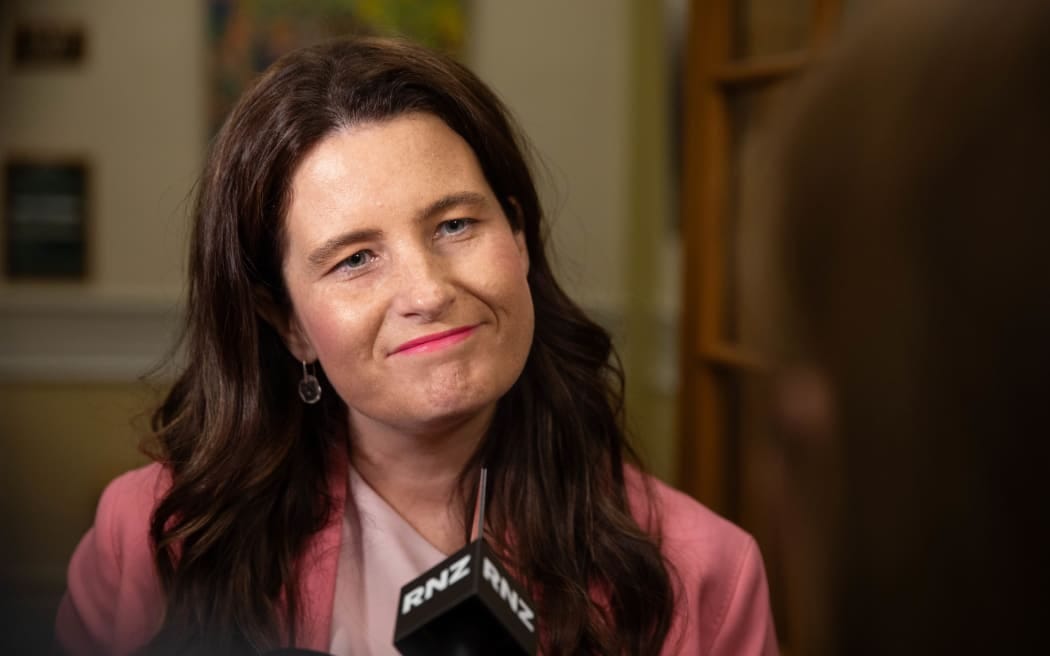
Instead of being seen as prudent managers, National is wearing the political pain of “cuts” without doing the cuts. That’s the worst of both worlds. You cop the bad headlines, the protests, the sob stories, and the accusations of cruelty, but you don’t get the fiscal gains that would justify them. It’s political sado-masochism.
If the government really was cutting, at least it could claim to be delivering on its promise to rein in Labour’s bloat. If it’s not cutting, it needs to hammer that point home until even the most hostile journalist can’t pretend otherwise. Right now, they’ve ceded the battlefield entirely and the public perception is that they’re being ruthless and ineffective.
National need to own their wins and blunt their losses.
One of the most frustrating things for engaged centre-right voters is that National does have successes to point to, but you wouldn’t know it unless you’re a politics nerd. Voters shouldn’t have to be political trainspotters to know what the government is achieving.
Every policy win should be accompanied by a simple, clear, repeated message about what it means for ordinary people. Every negative story should be met with an immediate, confident, and well-framed response. Not defensiveness. Not silence. Not a “we’ll get back to you on that.”
Look at what happened when Labour tried to trip up Education Minister Erica Stanford over NCEA reform. Labour tried to claim she hadn’t consulted and Stanford came back swinging with evidence of extensive engagement and reframed the whole debate around raising the bar for our kids. That was a textbook example of seizing the narrative. But instead of turning it into a week-long government-wide drumbeat with every minister reinforcing the message that “National is lifting standards in our schools” it was left to fade after one news cycle.

Click to view
The Government has hit home run after home run in the law and order space. Labour would have knighted Paul Goldsmith and Mark Mitchell if they were Labour ministers delivering such results. This policy area is one of the most emotionally charged. People really want to feel safe and, as a rule, the New Zealand electorate leans to the right on justice policies.
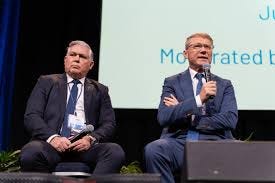
The government brought ram raids to a screeching halt almost immediately. They scrapped Labour’s failed prisoner reduction target, toughened sentencing for repeat violent offenders, and gave police greater powers to tackle gang activity. These are concrete actions that speak to voters’ concerns about safety. Yet the communication has been fragmented and reactive, allowing the media to focus on isolated incidents or opposition scare lines rather than the bigger picture of restoring law and order.
Think about what Ardern would do with this. How would she have used these wins to solidify her brand (and Labour’s)?
Ardern would have wrapped these wins into simple, emotive stories and repeated them until they were political wallpaper. She’d have been out front visiting dairy owners whose shops had been saved from ram raids, flanked by relieved parents and business leaders. She’d have used sympathetic victims’ voices to reinforce the narrative that her government was protecting ordinary New Zealanders. Every minister in her Cabinet would have been armed with the same talking points, and every media appearance, no matter the topic, would have included a nod to the government’s decisive action on crime.
She also would have pre-empted the criticism. Instead of waiting for the opposition or advocacy groups to accuse her of being “too tough” or “ignoring root causes,” she would have reframed the conversation in advance: this is about keeping communities safe, protecting livelihoods, and making sure the law-abiding majority can live without fear. By the time critics piped up, the public would already have heard, and internalised, her version of events.
National has the raw material to do the same, but they’ve let the narrative scatter. They’ve allowed the headlines to be about individual flare-ups or to be derailed into nitpicking about Oranga Tamariki bootcamps instead of the overarching shift back to law and order. If they owned the frame, voters wouldn’t just know about these policies; they’d feel them in the same way they felt Ardern’s “team of five million” pandemic message (before it got overplayed).
Last week, National could have curated a picture perfect media story easy peasy, but they missed the…train. After years of delay and ballooning costs under Labour, the City Rail Link is finally on track for completion, with National overseeing the final delivery stage. This should be framed as a symbol of competence, cleaning up after Labour’s mismanagement and getting critical infrastructure over the line. Instead, the milestone barely made a ripple, drowned out by unrelated headlines because no one in government was driving the message.
They should have made an event of it. They could have staged a reunion. Christopher Luxon, Chris Bishop, Simeon Brown, and their coalition partners (though they would be wise to elbow them out of the frame as much as possible), could have invited Sir John Key, Sir Bill English, and Simon Bridges on the first ride. They could have cemented the narrative that this was a National project from the beginning, briefly derailed by Labour, and that they were celebrating the success of long term infrastructure planning.
John Key could have flicked through old photos of him turning the sod in 2016 and made jokes about how much more hair he had then - but still more than Luxon has now (cue laughter)!
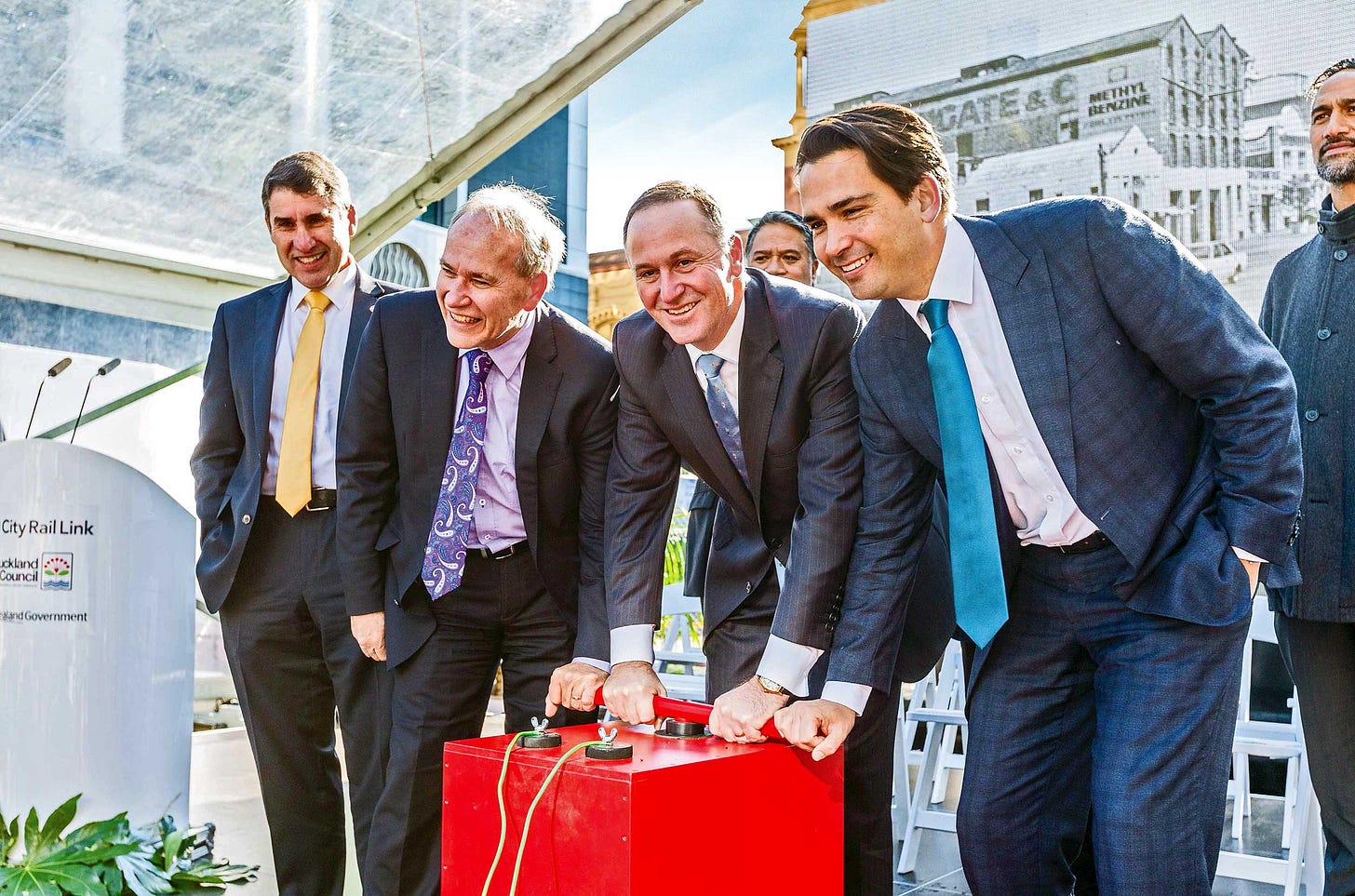
With Chris Bishop by his side, Bill English could have spoken to media about the decision making at the time and how governments grapple with spending extraordinary amounts on long term infrastructure projects setting the scene for Bishop to talk about the investments in infrastructure National are kicking off now.
Minister for Auckland Simeon Brown and former Transport Minister and current CEO of Auckland Business Chamber Simon Bridges could have sat down over a coffee and filmed a discussion about what CRL will do for Auckland businesses and commuters.
It would have been National’s show. No one would have been talking about Winston’s high-vis jacket (or lack thereof).
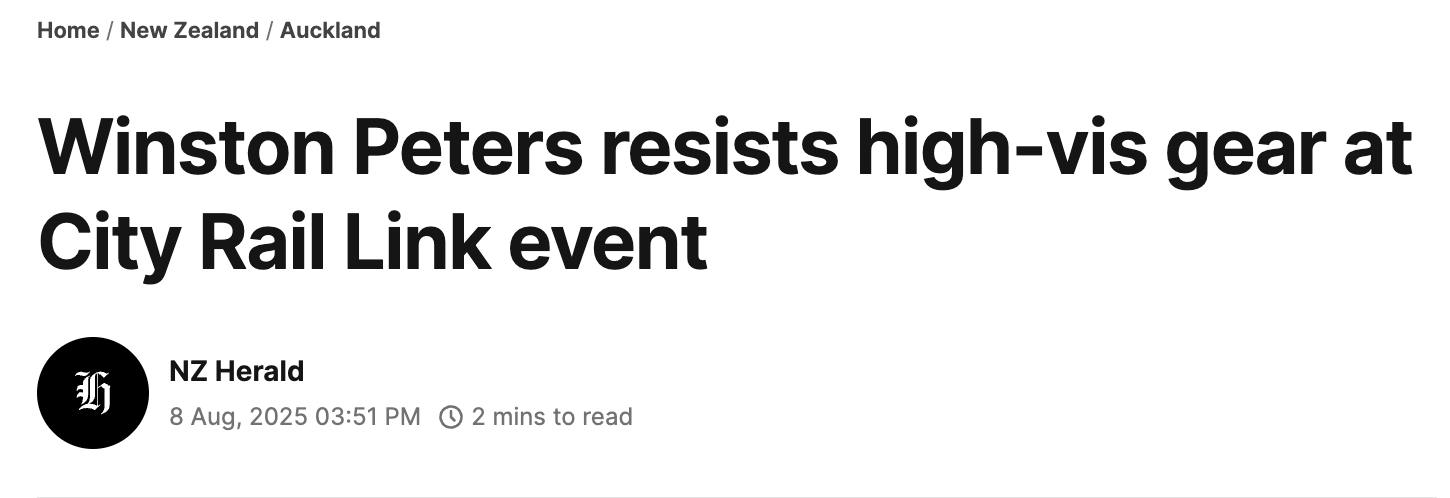
Right now, National is governing like a company that refuses to advertise its best products. In politics, if you don’t tell people what you’ve delivered, your opponents will tell them you’ve delivered nothing. And once that idea takes root, it is all but impossible to shift.
We live in an age of relentless information overload. People are hit with more headlines in a day than they used to see in a month. The party that wins is the one that gets its message to cut through that noise.
If National keeps letting the opposition dictate the headlines, it will bleed political capital like a stuck pig. Even policy wins will feel invisible. The public perception will harden into a story of drift and defensiveness. And once a narrative like that sets in, it is brutally hard to reverse as Labour found out after its post-Ardern slide.
The challenge for Luxon is to accept that communication is not something he can half-arse, it is the work. Setting the agenda is not a luxury for when the governing gets easier. It is an important part of the day job.
The next election will not be won by the party with the most balanced spreadsheets. It will be won by the party (or coalition) that convinces New Zealanders they are the safest pair of hands for the country’s future. That requires leadership, vision and, above all, the ability to tell the story in a way that sticks.
If National wants another term, it must stop governing as if communication is optional. Tell the story. Own the wins. Pre-empt the attacks. And for once, force the opposition to play catch-up.
My final piece of unsolicited advice for National is this: get out your cheque book and go shopping for the best political communications operative you can find. Get on a plane. Pay whatever it takes to convince them to come live in Christopher Luxon’s shadow until the day after the election next year. Look at the teams behind the big political campaign wins, but also the world’s best storytellers. Look at the best most talented people behind Obama, Brexit, MAGA, and more. Who is the best at creating populist messages from centre-right politics? Who is the master at persuading the middle-voter? Who knows how to make a movement?
This, in my opinion, could be the difference between National getting a second term and New Zealand being plunged back into at least three years of gaslighting from Hipkins. National cannot afford to be cheap. Bring in the big guns.
P.S. Just one more piece of advice! Once National has done this the party need to sit Luxon down and make it clear if he doesn’t start listening he will find himself on the bad end of rolled dice six weeks before the election a la Andrew Little.
Ani O'Brien comes from a digital marketing background, she has been heavily involved in women's rights advocacy and is a founding council member of the Free Speech Union. This article was originally published on Ani's Substack Site and is published here with kind permission.


11 comments:
What a brilliant summarisation Ani, you've hit the nail on the head with this one!
This is the best narrative I have seen in a long time. Story telling these days is equally, if not important than the results that are delivered. And it needs some crafty ways when the media is generally against you.
Interesting that Ani bemoans Luxons lack of spin doctor advice and rhetoric, whilst spouting the Labour Party spin doctor message.
Another idea Ani is to write the truth rather than spin (spin is a euphemism for lie).
Explain the cause of nzs pain.
Explain the only way out of the Clark advised Arderns self enriching financil disaster, costs taxpayers money.
Explain how Luxons infrastructure building thrust will provide life changing long term benefits
Explain how fixing the ridiculous nz housing ponzi scheme hurts but without the fix more families will be unable to afford children.
Go on.
I dare you to tell the truth!
>"... spin is a euphemism for lie."
Not quite. The Cambridge online dictionary defines spin (noun) as "a way of describing an idea or situation that makes it seem better than it really is, especially in politics." It may involve being a bit economical with the truth but it is more a matter of describing a situation as viewed through a particular ideological lens.
Another great article from Ani.
This stuck out in particular, “…dealing with a Prime Minister who, according to Beehive gossip, doesn’t always take advice easily.”
You know, this explains entirely what’s so unlikeable about Luxon because it comes across in the way he governs too. It reeks of a leader who is insecure and passive-aggressive. I would disagree that Winston is a good alternative but people like charisma and charm and he sells this so hard that people buy it even if they don’t agree (or understand) his politics. I hate that politicians need to be charming but I accept it’s true, but I must also believe that Luxon is both charmless and useless - an entirely ineffective combination.
Very interesting article Ani. Just one point I’d question. You’ve separated the economy and the culture wars as though they’re two separate issues. They’re not. The culture wars are an enormous handbrake on our economy. From endless consultations, cultural reports, karakia and maori religious observances to the eventual extraction of substantial bribes, NZ’s productivity is crippled while costs balloon. Some projects I’m sure are either not proposed at all, or are killed in their infancy as a result of this corruption. The culture wars matter. They are undermining our economy.
David Seymour has proven he’d make a brilliant PM
Barend.
Another euphemism for lie is.. "involve being a bit economical with the truth".
Attempting to blur the edges, doesn't change the fact spin is "economical with the truth"
IN OTHER WORDS.... A LIE!
Dear Ani, I really enjoy your pieces. Very informative and well written and this one is certainly no exception. Great CV actually :-). Would be great if someone inside National reads and takes the advice, maybe even gets in touch.
Anonymous 11.58
David seems to have grasped the communications problem by having his own camera crew following him around, filming him and also the M,S.M. crew. The fact that ACT have an unedited record of events has forced the M.S.M. to curb their highly biased editing .
A good start, but Jacinda's spin doctors have taken a much despised, totally incompetent P.M. and rebranded her as a celebrity worthy of praise that most cult leaders and despots would be envious of. This is the standard of the competition, time to employ some serious help or suffer the ignomy of being a one term govt. and watch this country go down the gurggler.
Quite so. In failing to grasp the simple fact that the separatist Maorification BS is the biggest single, local contributor to the killing of the NZ economy, Luxon is allowing our fair Country to backslide. Add in the global factors and it is a complete fiasco.
Post a Comment